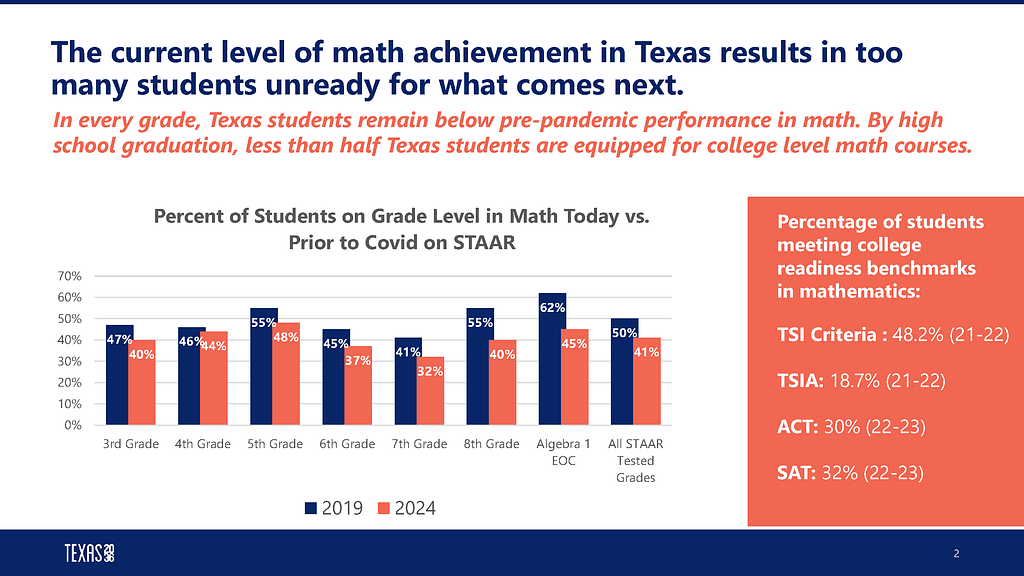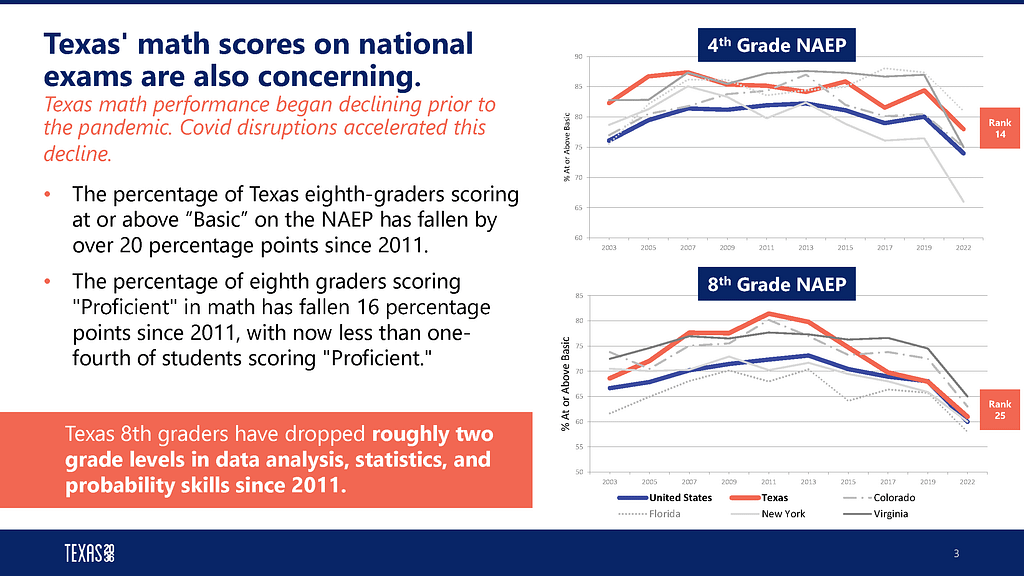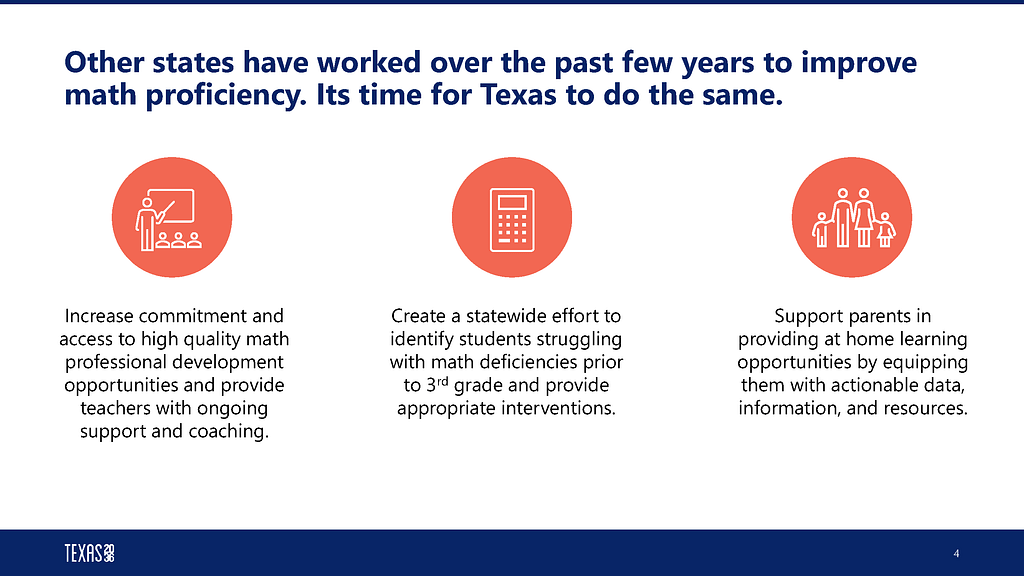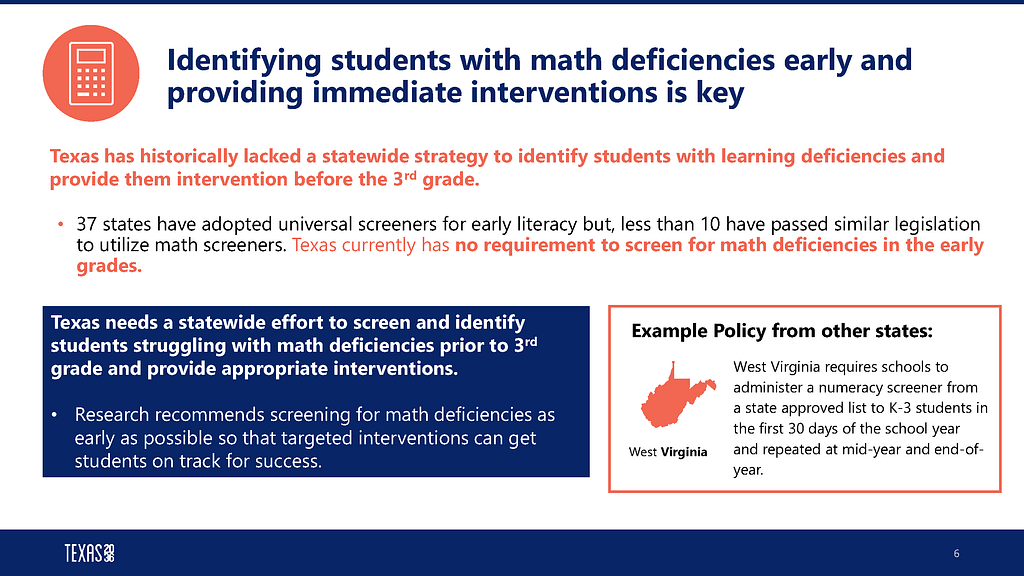Testimony: Texas can act now to improve students’ math readiness
Policy Advisor Gabe Grantham delivered testimony on math readiness to the House Public Education Committee on Aug. 13, 2024, from the following prepared remarks.
Chairman Buckley and committee members, my name is Gabe Grantham and I am a K-12 Education Policy Advisor at Texas 2036. I am grateful for the chance to address you on the topic of math readiness in Texas today.
The data are clear — our students are not meeting the math proficiency levels necessary for future success. The decline in math performance, evident across all grades, poses a significant risk to our students’ academic and career prospects. Today, I will outline the scope of the problem and propose a series of recommendations aimed at reversing this troubling trend and ensuring that every Texas student is equipped with the math skills they need to thrive.

Currently, less than half of our students in Texas are performing at grade level in math, with some grades seeing only about a third of students meeting the necessary benchmarks. Across all STAAR-tested grades, the percentage of students performing at or above grade level has decreased compared to pre-pandemic levels. This decline is not isolated to any single grade; it is a widespread issue affecting students from elementary through high school.
This decline in math performance has long-term implications, in part due to low success rate of remediation and acceleration effort. By the time students reach high school, less than half are prepared for college-level math courses, as indicated by their scores on the SAT, ACT and TSI exams. The inability to meet these benchmarks hinders their chances of success in higher education and the workforce, where strong math skills are increasingly critical.

Texas’ performance on national assessment of educational progress, the NAEP, further highlights the severity of this issue. Texas students, particularly eighth graders, have seen a significant decline in their math scores. This decline began before the pandemic and was exacerbated by the disruptions it caused. Over the past decade, the percentage of eighth graders scoring at or above the “Basic” level has plummeted by over 20 percentage points.
Even more alarming, less than one-fourth of our eighth graders are now considered “Proficient” in math. This means that the majority of our students are not just behind — they are losing ground in essential math skills, with some areas such as data analysis, statistics and probability skills showing a loss equivalent to roughly two years of learning.
While Texas ranks relatively high in certain student demographics compared to other states, this should not mask the broader achievement gaps. For example, while Texas ranks first in eighth-grade Black student achievement, the average score is still below the “Basic” level. These disparities underscore the need for targeted interventions to ensure all students, regardless of background, have the opportunity to succeed.

As other states have recognized the urgent need to improve math proficiency, they have taken proactive steps to address this issue. Texas must follow suit by investing in targeted interventions, especially for our youngest learners.
By providing ongoing professional development for teachers, focusing on early identification of math struggles, and equipping parents with the tools they need, we can begin to reverse the downward trend in math achievement and set our students on a path to success.

The ability of our teachers to effectively teach math is crucial to student success, yet only 36% of Texas principals report that their math teachers demonstrate a deep understanding of math teaching methods, and only 41% report their teacher having deep math content knowledge.
This is even more concerning at the elementary level, where the foundational skills are supposed to be established. Without robust professional development and continuous support, our teachers are not equipped to meet the needs of their students. Expanding access to high-quality math coaching and professional development programs can significantly improve the quality of math education across the state.

Texas is lagging behind in early math intervention, with no statewide requirement to screen for math deficiencies in young children. While many states have implemented universal screeners for early literacy, only a handful have done the same for math, and Texas is not among them.
This lack of early screening means that many students’ math challenges go unnoticed until they have already fallen significantly behind. Identifying and addressing math challenges before third grade is essential for helping students build a strong foundation in math. Texas must prioritize the implementation of early math screeners to catch and correct these deficiencies before they lead to long-term academic struggles.

In Texas, parents often do not realize the extent of their child’s struggles with math. Despite the fact that nearly 60% of students are not meeting grade-level expectations, only 10% of parents believe their child is underperforming in math. This disconnect underscores the importance of providing parents with clear, actionable data on their child’s math progress.
By doing so, and by offering resources that parents can use to support learning at home, we can bridge this gap and ensure that students receive the help they need outside the classroom as well. Texas has already taken significant steps through House Bill 1605 to provide parents with access to their child’s curriculum, but additional efforts are needed to equip them with accurate, actionable data and resources tailored to their child’s needs, ensuring students get the support they need to succeed in math.
Thank you again for the opportunity to speak to you today and for your commitment to Texas students.
